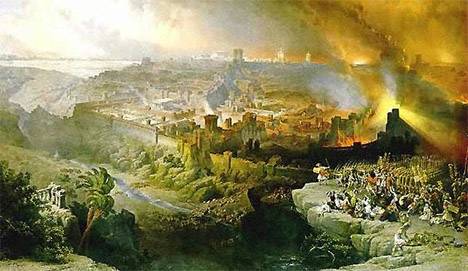Paradigm Shift

Joel McDurmon has put together a helpful list – an “Eschatological Resource Guide” – for those new to preterism and postmillennialism. He writes:
Continue reading

Joel McDurmon has put together a helpful list – an “Eschatological Resource Guide” – for those new to preterism and postmillennialism. He writes:
Continue reading
Since the sacred architecture of the Jew-Gentile social structure set up in Daniel was a spiritual expansion of the previous physical sanctuaries, we should not be surprised to find its shape serving as the foundation for the New Testament. Since the Holy Place symbolised the court of the King of Heaven, the Tabernacle sheds some helpful light on Jesus’ cryptic description of judgment from His throne in Matthew 25. It not only becomes clear why the Lord uses sheep and goats as symbols for Gentile nations, but their locations and destinies bring to an end a narrative thread which can be traced back to Genesis 4.

James Kirk learns via Vulcan mind meld that he will never marry.
Now as a concession, not a command, I say this. I wish that all were as I myself am. But each has his own gift from God, one of one kind and one of another. (1 Corinthians 7:6-7)
Reliance upon rules and regulations is a sign of immaturity. There’s nothing wrong with them, of course, just as there is nothing wrong with the “gutter guards” used to keep the ten pin bowling ball moving towards the pins for children’s parties at the bowling alley. Likewise, there was nothing wrong with creeds, rosary beads or religious paintings in their early days. They were simply mnemonic devices for the illiterate. But, just as it was with the Pharisees in the first century, these lifeless, inflexible “stoicheia” become a problem when they turn into legislation and become mandatory. Failing to tithe one’s kitchen herbs leads to certain destruction. The celibacy of certain prominent men in the Bible is part of this discussion. The question is not “Is celibacy holier than marriage?” but why were these spiritual giants, including Jesus, celibate at all?
This post has been slain and resurrected for inclusion in my 2015 book of essays, Inquietude.
Alastair Roberts points out for us that both sides of the debate concerning women in ministry have missed one salient point. From his post, Why A Masculine Priesthood Is Essential:
For as in those days before the flood
they were eating and drinking,
marrying and giving in marriage,
until the day when Noah entered the ark…
(Matthew 24:38)
The Oath/Sanctions section of the Revelation seems to have three parts. The judgment begins in the house of God (Temple bowls – Garden), then follows the revelation of the “mystery” of the Woman and the kings of the Land, and finally the judgment reaches out to the borders of the World (the oikoumene). This corresponds not only with the Garden, Land, World architecture of the nations in Genesis 1-10, it brings an end to the “intermarriage,” the compromise of the Priestly people with idolatrous kings. It is fitting that the third part of this judgment (chapters 18-19) culminates in a Red Wedding.
Continue reading
Why are there four Gospels? There would be so much less confusion — and theological spade work — if there were just the one. The most obvious answer is that each one was written for a different audience, as described here. The least obvious answer is that God was not only writing the commandments in human flesh, He was also “measuring out” the architecture of the Tabernacle in humanity.
In a Land from which Cainites were being dispossessed, Israel herself would not only judge between the manslayer and the avenger of blood, but provide cities of refuge to the “firstborn” Levites as a gift.
The Avenger of Blood
Like Adam, Cain would not “bear” his sin. But unlike Adam, Cain was rejecting the covering of animal substitutes. As the “offspring” of the serpent (kinghood without priesthood), he only understood law as tyranny. There was no place for mercy (Atonement) because mercy required Covenant confession.